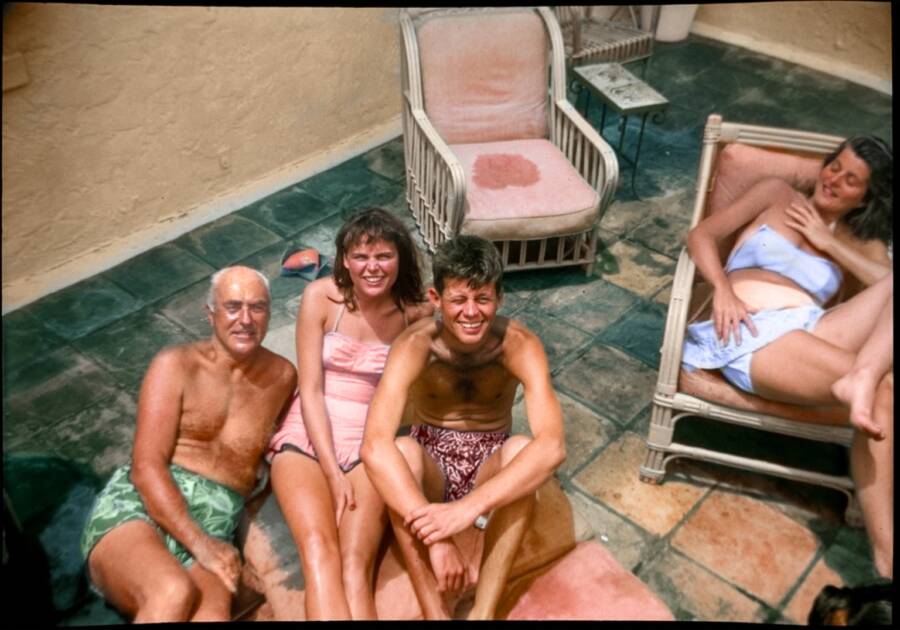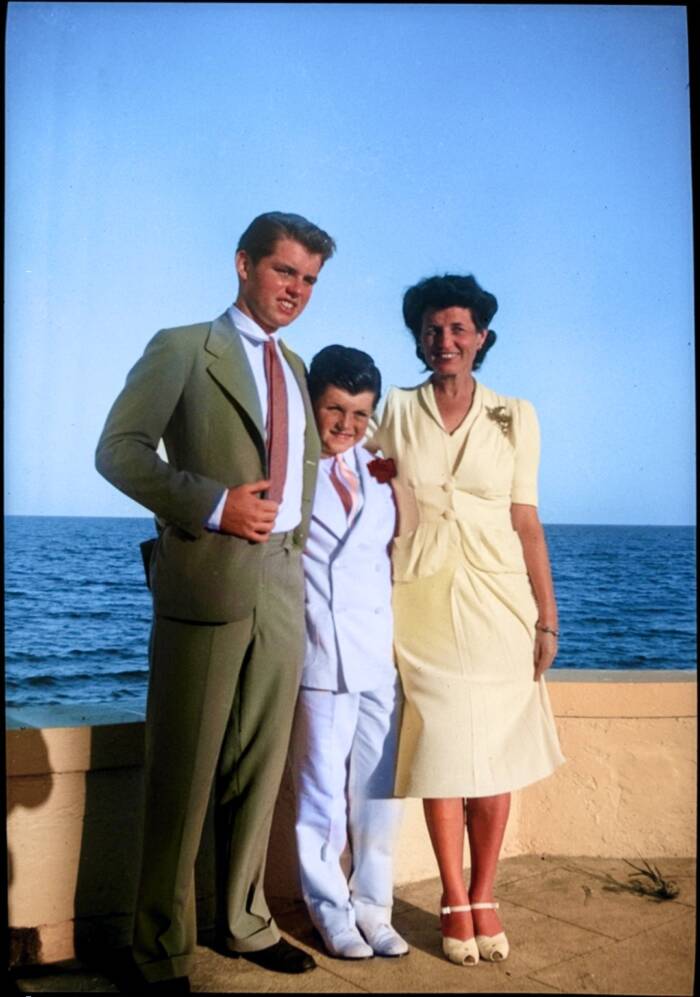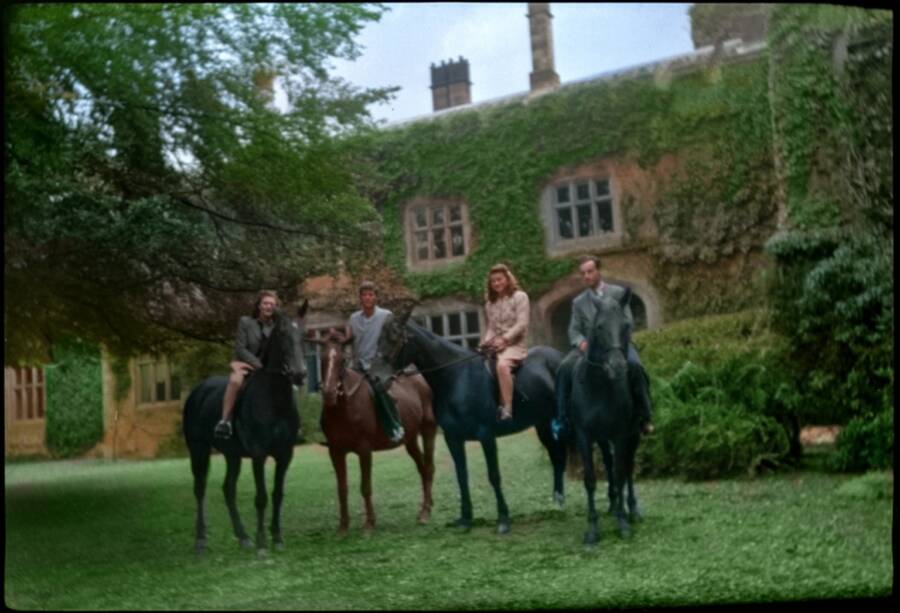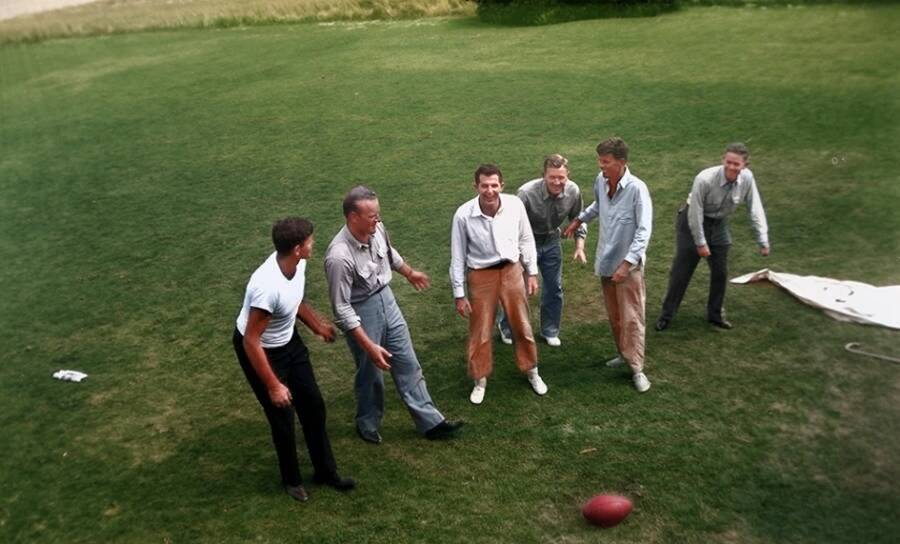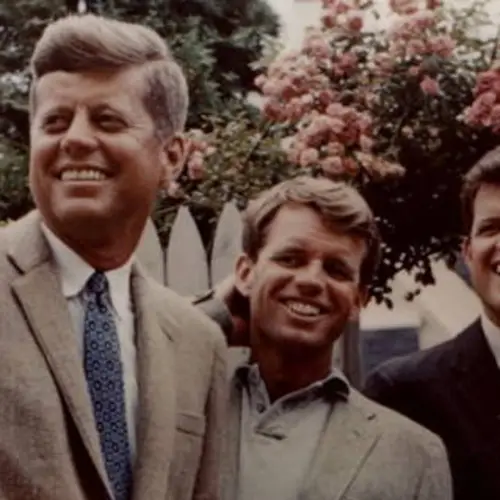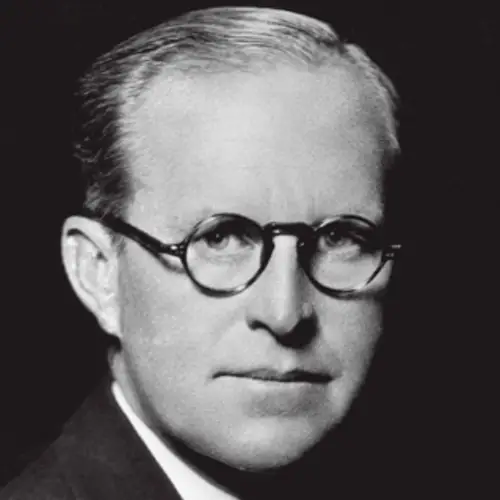These vivid photos give a new perspective on the lives of John F. Kennedy and his siblings before their family became America's most famous political dynasty.
For much of the 20th century, one family name seemed synonymous with American politics, public service, and — tragically — loss: Kennedy.
Rising from immigrant roots to the highest offices in the nation, the Kennedys became emblematic of both the promise and the peril of American ambition. They were glamorous, fiercely competitive, and deeply connected to the political heartbeat of the United States.
The family's story in America began with Patrick Joseph Kennedy, a poor Irish immigrant who arrived in Boston in the mid-19th century. By hard work and shrewd investments, P. J. built wealth in the liquor trade and local politics. His son, Joseph P. Kennedy Sr., took that legacy to another level, amassing a fortune in banking, real estate, film, and the stock market. Joe Sr. also had political aspirations, serving as U.S. Ambassador to the United Kingdom in the late 1930s — and those aspirations would follow his family to the modern day.
Joe Sr. and his wife, Rose Fitzgerald Kennedy — herself the daughter of a prominent Boston mayor — together raised nine children with a mix of strict Catholic discipline and relentless expectations. This combination would produce war heroes, senators, advocates for social change, and even a U.S. president.
But it would also lead to very public family tragedies.
Growing Up In The Kennedy Household
To understand what it was like growing up in the Kennedy household, it makes sense to follow the life of the most famous member of the family: John Fitzgerald Kennedy, the 35th president of the United States.
John F. Kennedy — best known as simply JFK, or as "Jack" to his family — was born on May 29, 1917, in Brookline, Massachusetts, the second son in the Kennedy household. His siblings included Joseph Jr., Rosemary, Kathleen ("Kick"), Eunice, Patricia, Robert ("Bobby"), Jean, and Edward ("Ted"). The Kennedys lived in comfortable affluence, with vacation homes in Palm Beach and Hyannis Port on Cape Cod.
Young Jack's childhood was often interrupted by a string of health issues, many of which went undiagnosed. The JFK Presidential Library identifies one such ailment as a bout of scarlet fever at three years old, but it was hardly the only affliction he grappled with.
As such, Jack spent a good portion of his early years recuperating.
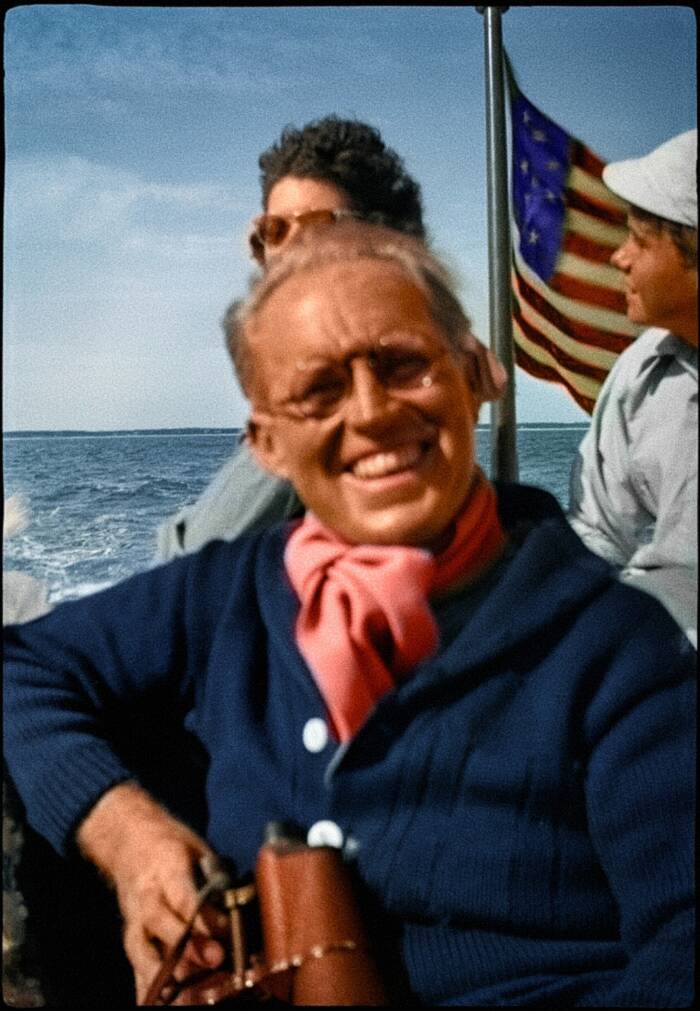
John F. Kennedy Presidential Library ArchivesJoseph P. Kennedy Sr. on a boat off the shore of Chatham, Massachusetts, in September 1941.
Joe Sr. raised his children in a home that emphasized competition and personal achievement. Family gatherings often turned into contests — swimming races, touch football games, and academic debates among them. He did not hide his ambitions for his children, either. In fact, Joe Sr. often and openly told his children they were destined for great things. Somewhat ironically, Jack was the one child who, based on his track record at school, seemed to earn the most pity from his father.
"I am not expecting too much, and I will not be disappointed if you don't turn out to be a real genius," Joe Sr. once wrote in a letter to Jack, "but I think you can be a really worthwhile citizen with good judgment and understanding."
Rose Kennedy, meanwhile, ran the household with the help of various nannies and cleaners. To both Rose and Joe Sr., their children's education was a top priority. They brought in tutors, sent them to elite prep schools, and constantly encouraged them to read, debate, and learn while they were still young.
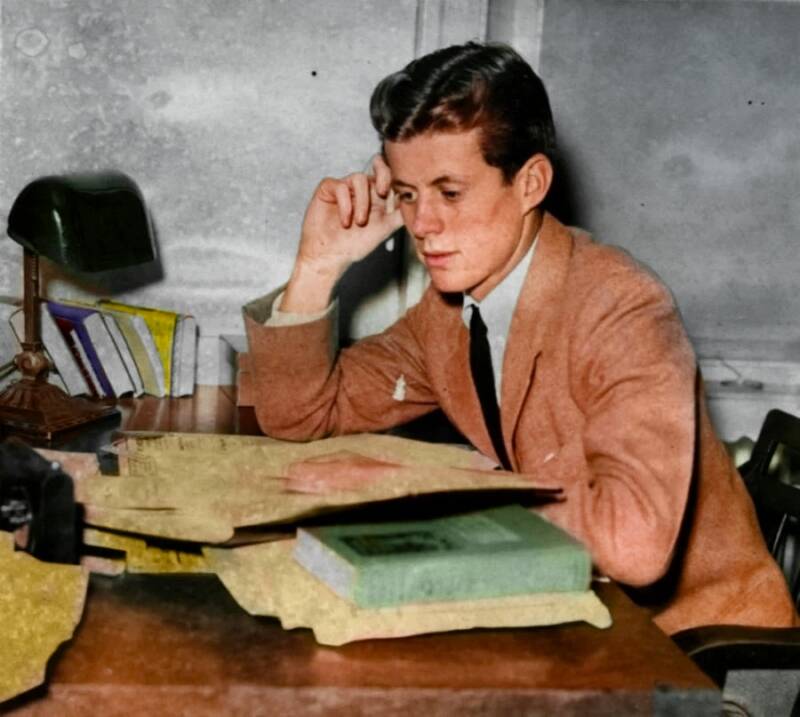
John F. Kennedy Presidential Library ArchivesA young John F. Kennedy in the midst of his studies at Harvard University. Circa 1939.
The Kennedys naturally attended some of the nation's most prestigious schools. Both Joseph Jr. and Jack studied at Choate, an elite preparatory academy in Connecticut, where their competitive streak continued. Jack then went on to attend Harvard, graduating in 1940 with a senior thesis on Britain's military unpreparedness — later published as Why England Slept.
"A man may die, nations may rise and fall, but an idea lives on."
The other Kennedy children followed similar paths. Kathleen attended the Finch School in New York and studied in England; Eunice graduated from Stanford; Robert went to Harvard and later the University of Virginia School of Law; and Ted attended Harvard before serving in the Army and later also graduating from law school at the University of Virginia.
But as is the case for many Ivy League families, higher education was about more than just book learning for the Kennedys. It was a chance to develop leadership skills, network, and hone the talents they would need to influence the national — and in many cases international — stage.
This was the plan their father had for them, and he oversaw every step on their road to success.
How Joseph Kennedy Sr. Paved The Road For His Children
Joe Sr. functioned as the family's strategist, in a sense. He was a savvy investor who built a fortune first through banking, then producing Hollywood films, then the liquor business, and finally the stock market. And if that timeline seems a bit wonky, considering a decade of Prohibition sits firmly in the middle, that's because Joe Sr.'s reputation was also a bit controversial.
While there are no documents that confirm Joe Sr. had connections with the Mob or supplied them with liquor during Prohibition, various testimonies insinuate some complicity. One rumor, for instance, said that Joe Sr. had brought scotch to his 10th Harvard reunion by boat. Mobster Frank Costello also claimed to have been in a silent partnership with Kennedy during Prohibition — and that Kennedy effectively ran a monopoly on liquor imports.
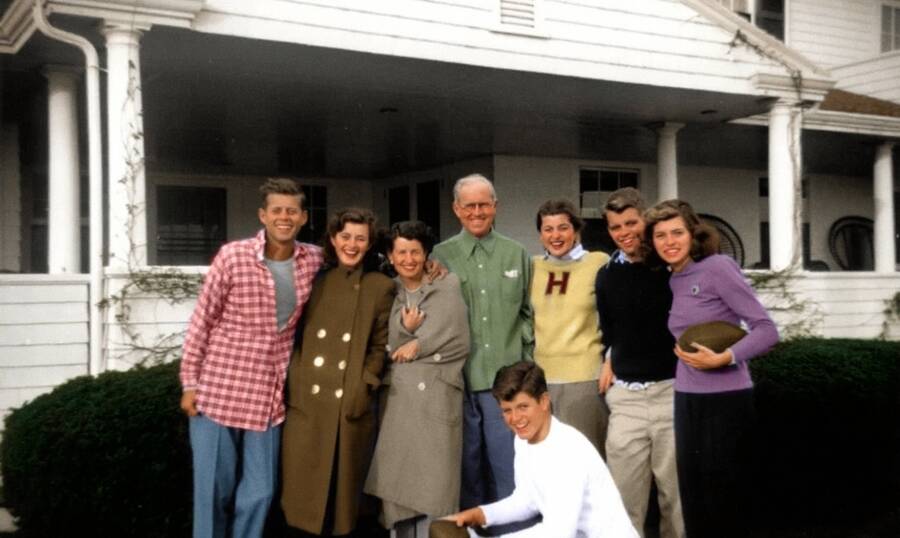
John F. Kennedy Presidential Library ArchivesLeft to right: John F. Kennedy, Jean Kennedy, Rose Fitzgerald Kennedy, Joe Kennedy Sr., Ted Kennedy (kneeling), Patricia Kennedy, Robert F. Kennedy, and Eunice Kennedy. The family stands outside their summer home in Hyannis Port, Massachusetts, circa 1948.
Whether these were just rumors or not, Joe Sr. certainly made a great fortune in booze distribution following the repeal of Prohibition. And like many of his descendants, Joe Sr. was greatly influential in politics.
His political career notably included serving as chairman of the Securities and Exchange Commission and as U.S. Ambassador to the United Kingdom. His time in the role was largely characterized by a cautious, isolationist approach, especially after the outbreak of World War II and witnessing the devastation of the war in Europe firsthand.
This made him wary of U.S. involvement in the war, but the isolationist attitude did not dampen his belief that one of his sons could — and should — become president. In fact, he had a clear hierarchy in mind: Joseph Jr. would be raised up to one day be the president, while Jack was essentially a backup option.
That was, until fate intervened.
World War II Propels The Kennedys Into Public Roles
World War II was a major turning point for the Kennedy brothers. Joseph Jr., a Navy pilot, was killed in 1944 during a dangerous mission in Europe, leaving the family devastated — and redirecting Joe Sr.'s presidential hopes toward Jack.
JFK, for his part, also served heroically in the Pacific, commanding the PT-109 and earning the Navy and Marine Corps Medal for saving his crew after a Japanese destroyer sank their boat. Shortly after, he ran for Congress in Massachusetts' 11th congressional district, which he won in 1946. Six years later, he was elected to the Senate.

John F. Kennedy Presidential Library ArchivesJoseph Kennedy Jr. lying in the grass with a pipe in Scotland. 1937.
Come 1960, John F. Kennedy had earned enough respect in Washington, D.C. to receive the nomination for the United States presidency from the Democratic Party. Robert and Ted followed: Robert became U.S. Attorney General and later a senator from New York, and Ted went on to serve nearly 47 years as a senator from Massachusetts.
The Kennedy sisters also found public roles. Jean served as U.S. Ambassador to Ireland. Kathleen worked for the Red Cross during World War II and later married into British nobility. Unable to escape the tragic fates that befell many Kennedys, however, her life was cut short in a plane crash in 1948.
Eunice Kennedy Shriver, meanwhile, founded the Special Olympics — inspired to do so by the heartbreaking story of her elder sister, Rosemary.
The Tragic Story Of Rosemary Kennedy
From early childhood, Rosemary Kennedy had exhibited developmental delays, partly stemming from a difficult birth and a lack of oxygen that caused lasting damage to her brain. While the family tried to keep her integrated in social and educational settings, she struggled academically and emotionally.
Things got worse when she entered her early 20s. Suddenly, she began to experience severe mood swings, which occasionally led to violent outbursts. Despite this, her mother described her as "an affectionate, warmly responsive, and loving girl. She was so willing to try to do her best, so appreciative of attention and compliments, and so hopeful of deserving them."

John F. Kennedy Presidential Library ArchivesRosemary Kennedy stands outside the Kennedy family home in Palm Beach, Florida, circa 1937 — four years before her tragic lobotomy.
Joe Sr., however, was concerned about the seemingly worsening state of his daughter's mental faculties.
So, in 1941, he authorized a procedure that he hoped would calm Rosemary's behavior: a lobotomy. The operation was catastrophic, leaving Rosemary permanently disabled and with the mental capacity of a young child. As a result, she spent the rest of her life in care facilities, hidden away from public view.
And as her brothers reached the highest peaks of success, Rosemary's tragic fate became a dark footnote in the Kennedy legacy.
The Kennedy Legacy And The Fall Of Camelot
JFK's presidency ushered in a new era of optimism for the American people. Kennedy pushed for sweeping civil rights legislation, declared the goal of landing a man on the Moon before the decade's end, established the Peace Corps, and expanded support for education and healthcare. Robert and Ted were equally influential in shaping legislation on civil rights, healthcare, and social programs. They knew that knowledge, not ignorance, would make the nation great.
"The greater our knowledge increases, the greater our ignorance unfolds."
Kennedy's term in the White House came to be known as "Camelot," a reference to the castle of King Arthur — equating his presidency to a utopian kingdom of legend. But, like Camelot, it could not last.

John F. Kennedy Presidential Library ArchivesJoe Kennedy Jr. holds the family dog, Fury, outside of the Kennedys' Palm Beach home. December 1941 or January 1942.
JFK was assassinated in 1963. Five years later, Robert was killed while campaigning to become the Democratic nominee for U.S. president. The family had already suffered tragedy with the fates of Joseph Jr. and Rosemary. The "Kennedy Curse" had claimed the lives of JFK's children, Patrick and Arabella, at birth. JFK Jr. would later die in a plane crash.
Through the tragedies, the Kennedys soldiered on, though not all handled it well. Even today, 60 years after Camelot, the Kennedy name continues to influence politics. The question now is what that means for the Kennedys' ultimate legacy.
After this look back at the Kennedy family, read about Prescott Bush, the father of George H.W. Bush. Then, go inside the story of the Astor family, another prominent American dynasty.
